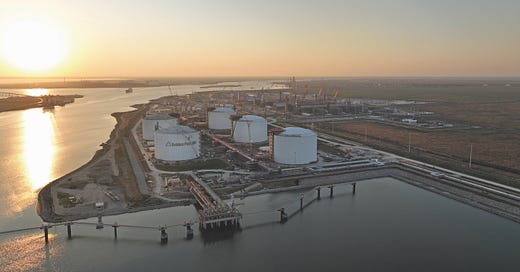Impact of Turkey’s Potential LNG Deal with ExxonMobil on Russian Gas Supplies and Global LNG Markets
With 2 charts, a table, and a map
EOA’s Main Takeaways:
Turkey’s potential LNG deal with ExxonMobil to import 2.5 mt per year will have no impact on Russia’s gas market share in Turkey as contracts that will expire in the next two years are expected to be renewed. It will not affect Moscow’s ambitious plan to build a hub for Russian gas in Turkey. Finalizing this 10-year contract will help reduce the amount of the uncontracted LNG in the market. Every time a long-term LNG contract is signed, less LNG will be available to the spot market, leading to lower volatility. It will also help Turkey renegotiate contracts with Russia and Iran when they expire in the next two years.
Construction at Golden Pass LNG. Source: ExxonMobil
Turkey has been in talks with ExxonMobil to ink a new LNG supply deal that would allow it to reduce its reliance on a single gas supplier, Turkish Energy Minister Alparslan Bayraktar revealed in a recent interview with the Financial Times. Ankara is seeking a “new supply portfolio”, and the potential deal with the US energy supermajor would secure up to 2.5 million tons of LNG per annum (mtpa) under a long-term contract that could last up to 10 years.
The deal, which remains under discussion so far, could be seen as a Turkish move to diversify gas supply sources away from Russia. However, we believes that such an agreement would not have a major impact on Russia’s current role as Turkey’s biggest gas supplier. The volumes that could be secured in a future deal with ExxonMobil will represent only a small portion of current Russian gas shipments to Turkey. We also believe that Turkey’s interest in the deal is related to its close relationship with Qatar, who is ExxonMobil partner in Golden Pass LNG, the project that should supply the LNG to Turkey. Yet, this potential contract and others in teh future would strengthen Turkey’s position in the negotiations with Russia and Iran when current contracts expire in 2025 and 2026.
Turkey’s Gas Market: Heavily Reliant on Imports
Keep reading with a 7-day free trial
Subscribe to Energy Outlook Advisors' Newsletter to keep reading this post and get 7 days of free access to the full post archives.





